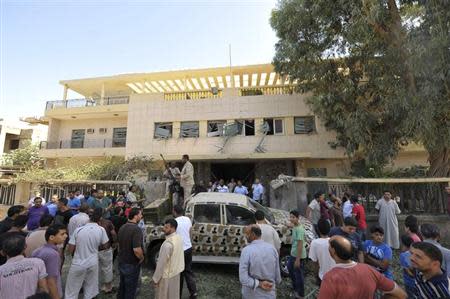Car bombs hit Swedish consulate, mosque in Libya's Benghazi

By Ayman al-Warhalli and Firas Bosalum BENGHAZI, Libya (Reuters) - Car bombs exploded outside the Swedish consulate and a mosque in Benghazi on Friday, a day after the brief abduction of Prime Minister Ali Zeidan showed the extent of Libya's turmoil two years after Muammar Gaddafi's fall. Nobody claimed responsibility for the attacks that damaged buildings and wounded one person in the north African country where a weak government is struggling to control militias and radical Islamists. Premier's abduction points to anarchy West has little chance of influence Hague rules spy chief can be tried at home That raid prompted calls by Islamist militants for revenge attacks. The front of the Swedish consulate and neighbouring buildings were damaged by Friday's blast but no one was hurt, Sweden said. "The facade and windows were damaged but no staff was injured. The consulate is closed on Fridays," Foreign Ministry spokeswoman Ursula Ahlen said. Sweden is one of the few countries that still have a mission in Benghazi. Its building also houses the office of Finland's honorary consul. The coastal city, where many people demand autonomy from Tripoli, has seen a string of attacks on foreign missions and companies as well as assassinations of army and police officers. In another part of Benghazi, a car bomb wounded a preacher as he came out of a mosque after Friday prayers, a security source said, adding that the attack was probably part of a rivalry between armed groups. Zeidan, who was released by his captors on Thursday after a few hours, is under public pressure for failing to improve public services since Gaddafi's overthrow. He has faced a wave of strikes and protests that have close most Libyan oil ports. To help maintain security, the government relies on militias made up of thousands of Libyans who took up arms against Gaddafi. But the rival groups have often become security threats themselves. This is especially true for Benghazi, where the 2011 revolt began and where the U.S. ambassador was killed during an Islamist assault on a U.S. diplomatic mission a year ago.
